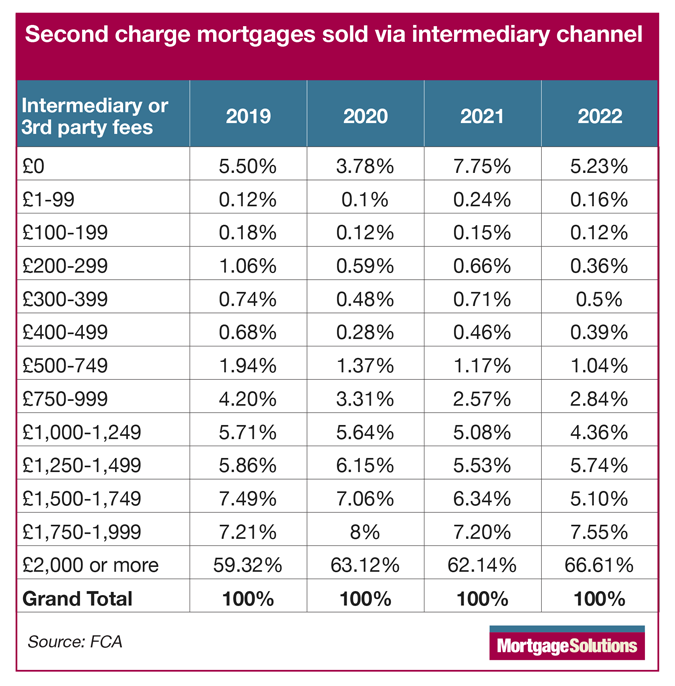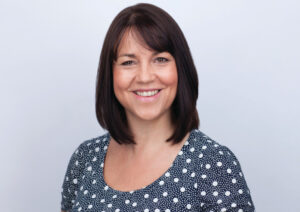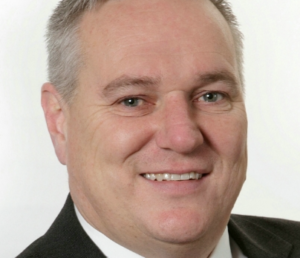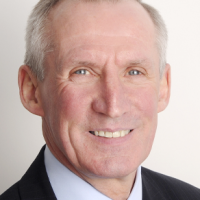Data from the regulatory authority revealed that in 2022, about 67% of second charge mortgages brokered incurred fees of £2,000 or more. This marks a continued upward trend since 2019. It rose from 59% to 63% in 2020 and reached 62% in 2021. This indicates a consistent climb in associated costs.
A Freedom of Information request submitted to the Financial Conduct Authority (FCA) by Mortgage Solutions revealed these findings. Interestingly, the percentage of brokers charging no advice fee declined from nearly 8% in 2021 to 5.23% in 2022.
Further analysis shows a decrease in brokers charging up to £1,000. This dropped from about 9% in 2019 to 5.41% now. Meanwhile, those charging £1,000 to £2,000 have also decreased.
They went from 26% in 2019 to 24% in 2021 and 23% in 2022. This data points to changing mortgage fees and evolving financial dynamics.
Regulatory transformation in second charge mortgages
In 2018, a pivotal moment occurred when the regulatory body communicated formally to CEOs. They highlighted discovering “significant issues” within the second charge lending market. Consequently, firms were sternly advised to reassess and enhance their operational procedures.
This regulatory step change has brought about a new era of compliance and vigilance in the industry.

First and second charge mortgages fee structures incomparable

Syms explained that second charge mortgages involve requirements beyond those for a first-charge mortgage. This specialised nature contributes to the higher fees associated with brokering these transactions.
In essence, the intricacies of second charge mortgages necessitate a distinct approach, making them more complex than conventional mortgages.
“These requirements include obtaining the credit report, checking with the existing lender for second charge acceptability, and obtaining written consent. If the debt is consolidated, brokers must get statements from the current mortgage company and other credit companies.
They also need to obtain a desktop valuation and know when a full valuation is necessary. This involves instructing and checking the land registry for restrictions or covenants,” Syms added.
She continued that other obligations include setting up accounts with credit agencies and valuation providers. There is a cost for every search, which must be completed before a lender reviews the application.
Fee structures
“The adviser effectively becomes the initial underwriter, and not all advisers have the skills, knowledge, or systems to complete this work. Therefore, an adviser usually turns to master brokers specialising in this sector. The work done by this firm needs to be included in the fee charged to the client,” Syms said.

She said it’s important not to compare the fees on first- and second-charge mortgages as the “skills, process, knowledge and amount of work required are completely different.”
Nicholas Mendes, mortgage technical manager at John Charcol, agreed that the approval processes were more manual with second charge, adding that less technology was used to automate parts of the approval side.
He added that growing fees could also be attributed to higher demand and tighter lending criteria due to rising rates and squeezed affordability.
Operational expenses on the rise for second charge mortgages

According to Positive Lending’s CEO, Paul McGonigle, the prevailing narrative suggests that two-thirds of borrowers are paying £2,000 or more. However, he clarified that his firm’s experience paints a different picture, with the average fee falling from £1,000-1,249.
McGonigle emphasised that larger fee-charging firms like his cover the client’s mortgage survey and reference request costs and absorb losses from down-valuations without passing the burden to the client.
Taking a pragmatic stance, he expressed that if mortgage brokers adopted a similar approach, it could significantly increase average mortgage fees.
Acknowledging the increased complexity and expenses associated with second charge mortgages, McGonigle highlighted an 11% rise in operational costs for this product line. Despite this, he affirmed that Positive Lending has shouldered most of these costs while maintaining a profitable business.
The FCA will inquire about the primary beneficiary of the deal
The FCA is set to examine who stands to gain the most from a deal, questioning whether it’s the broker or the customer. According to Robert Sinclair, CEO of the Association of Mortgage

Intermediaries, the customer might not benefit significantly from the arrangement, especially if they’re borrowing existing funds and adding broker fees. This practice could obscure larger fees, potentially reaching a substantial amount like £3,000 or more.
Sinclair emphasises the need to address transparency issues in the sector. He points out that justifying the value and fees requires scrutiny of the work involved.
He questions the allocation of tasks between experienced advisers and administrative staff, highlighting that clerical personnel handle much of the work in second charge mortgages, dealing with legal documentation and settling existing debts.
In addition, Sinclair raises concerns about the concentration of business within a few key players in the sector. He suggests that this concentration allows the regulator to understand the landscape, prompting further examination into the practices and justifications for fees within these select entities.
Consumer Duty | The driving Force behind fee Alignment
According to Robert Sinclair, brokers in the second charge mortgage market often justify fees by referencing acquisition costs and administrative demands. These tasks include overseeing legal processes, packaging cases, and sometimes utilising in-house underwriters. Transitioning between roles, brokers ensure compliance with complex requirements, but their fees face scrutiny from regulators.
Sinclair emphasised that regulators may compare these fees to those associated with other financial products. However, this comparison does not always account for the relative costs involved. A particular challenge arises because fees may originate from the same location but not the same legal entity. This structure creates ambiguity regarding what fee levels are considered reasonable or acceptable.
Fee Alignment
Despite initial expectations that fees for second charge mortgages would gradually align with those of more mainstream products, tension remains. This ongoing disparity primarily exists between first-charge firms and those focused on second charges. Sinclair highlighted that these differences in fee structures continue to pose challenges for brokers and clients alike.
While some fee adjustments have occurred due to the growing popularity of second charge mortgages, a significant gap persists. Sinclair suggested that implementing the Consumer Duty framework might help address these disparities. He views this regulatory development as an opportunity for better alignment across the market.
Looking to the future, Sinclair expressed optimism about potential changes but acknowledged ongoing challenges. He hopes fees will reduce over time, particularly as second charge mortgages gain wider acceptance. However, he also recognised the difficulty of reconciling the current significant price differences. He believes this will require careful monitoring and industry cooperation to achieve fairer outcomes for borrowers and brokers.
Some second charge brokers will need to ‘alter their approach’
McGonigle highlighted the need for brokers to adapt their models in response to these changes. He pointed out the long-standing push for reduced fees and expressed optimism about brokers responding positively. However, he raised concerns about dominant market players potentially distorting data, which could result in inflated fees. He argued for a broader, more balanced view of market dynamics, emphasising that intermediaries are not the sole influencers.
Nicholas Mendes, mortgage technical manager at John Charcol, supported McGonigle’s perspective. Mendes stated that Consumer Duty would likely prompt second-charge brokers to reassess their fee structures. He predicted the FCA would compare charges among firms of similar size to ensure fairness. Mendes stressed the importance of brokers justifying their fees as offering fair value to customers.
Fees
Mendes acknowledged that fees between first and second charge mortgages might differ. However, he warned against excessive fees that could discourage competition. He noted that attempting to equalise fees with first-charge options might reduce second charge availability. Mendes attributed this risk to concerns about profitability among second-charge providers.
Mendes emphasised the need for well-supported fair value assessments to align with the regulator’s goals. This approach, he argued, would promote healthy competition while ensuring compliance with FCA standards. By adhering to these principles, brokers could maintain trust and deliver better customer outcomes.
He stressed the importance of maintaining well-justified fair value assessments for FCA inspection. This approach would align with the regulator’s strategic objectives and foster healthy market competition.
Credit to Mortgage Solutions
Thank you for reading our publication “Second Charge Mortgages |2/3 of Brokers Charge Fees over £2k.” Stay “Connect“-ed for more updates soon!



